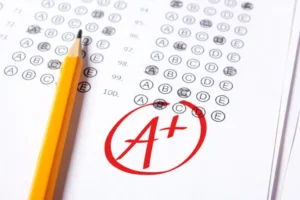In a tech-infused educational landscape, the allure to manipulate academic records is palpable. Amidst this, the question arises: How can I change my grades? This query delves into the ethical labyrinth of academic integrity, urging us to ponder its implications.
Attempting to change your grades through unethical means, such as hacking into systems or altering records, is not only dishonest but can also lead to severe repercussions, including academic penalties and damage to your reputation. Instead of resorting to such actions, it’s crucial to prioritize ethical behavior and focus on legitimate ways to improve your academic performance.
This involves seeking help from teachers or tutors, engaging in thorough study sessions, and actively participating in class to deepen your understanding of the material. By investing genuine effort into your education and adhering to principles of academic integrity, you not only enhance your knowledge but also develop essential skills and qualities that will serve you well in the future.
“CHANGE YOUR GRADE WITHOUT BEING CAUGHT WITH A PRO HELP TODAY”
Importance of grades in academic success

Understanding the importance of grades underscores their significance in fostering academic growth and ultimately shaping the trajectory of students’ educational and professional endeavors. Below are the importance:
- Measurement of Learning: Grades are used as a measure of how well a student has grasped the material covered in a course. They provide a tangible representation of a student’s understanding of the subject matter.
- Motivation: Grades serve as a motivational tool for students. Many students strive to achieve high grades as a means of validation for their efforts and abilities. The desire to earn good grades can drive students to study harder and engage more deeply with the material.
- Feedback: Grades offer valuable feedback to both students and educators. For students, grades indicate areas where they excel and areas that may need improvement. Educators can use grades to identify struggling students and tailor their instruction accordingly.
- Credentialing: Grades are often used as a basis for determining eligibility for certain opportunities, such as scholarships, internships, and admission to higher education institutions. Good grades can open doors to a variety of academic and career opportunities.
- Accountability: Grades hold students accountable for their academic performance. By providing a clear assessment of their progress, grades encourage students to take responsibility for their learning outcomes.
- Parental and Institutional Expectations: Parents, as well as educational institutions, often have expectations regarding student performance, and grades serve as a means of evaluating whether those expectations are being met.
- Preparation for Future Endeavors: Strong academic performance, as reflected in grades, can pave the way for success in future endeavors, whether in higher education or the workforce. Employers and admissions committees often consider academic transcripts as part of their evaluation process.
While grades are undoubtedly important, it’s essential to recognize that they are not the sole indicator of academic success or a student’s capabilities. Factors such as critical thinking skills, creativity, collaboration, and practical application of knowledge are also crucial for long-term success in academics and beyond.
How can i change my grades
Attempting to change your grades through unethical means, such as hacking into school systems or bribing teachers, is not only dishonest but also carries serious consequences. It violates academic integrity policies and undermines the trust and fairness of the educational system. If caught, you could face disciplinary actions ranging from failing grades to expulsion, and it may also harm your future academic and professional opportunities.
Instead of resorting to dishonest methods, it’s important to focus on legitimate ways to improve your grades, such as seeking help from teachers, studying effectively, and putting in consistent effort. By committing to ethical behavior and genuine academic growth, you not only improve your grades but also develop integrity and valuable skills that will benefit you in the long run.
Furthermore, attempting to change grades through unethical means not only undermines the purpose of education but also fails to address the root issues that may be causing academic challenges. It’s important to recognize that everyone encounters difficulties in learning at some point, and seeking help and support is a more effective and honorable approach to overcoming obstacles.
By reaching out to teachers, tutors, or academic counselors, you can receive guidance tailored to your specific needs and develop strategies to improve your academic performance legitimately. Remember, true growth and success come from facing challenges with integrity and perseverance, rather than resorting to dishonesty shortcuts.
Ethical Considerations
Improving academic performance requires a combination of effective strategies tailored to individual needs and circumstances. Here are some strategies for academic improvement:
- Set Clear Goals: Establish specific, achievable goals for your academic performance, such as improving grades in specific subjects or achieving a certain GPA. Having clear objectives provides direction and motivation for your efforts.
- Develop Effective Study Habits: Adopt study techniques that work best for you, such as breaking down study sessions into manageable chunks, using active learning methods like summarizing and teaching the material to others, and regularly reviewing and practicing course material.
- Manage Your Time Wisely: Create a realistic schedule that allocates dedicated time for studying, attending classes, completing assignments, and engaging in extracurricular activities or leisure pursuits. Prioritize tasks based on deadlines and importance to maximize productivity.
- Seek Help When Needed: Don’t hesitate to ask for assistance when you encounter difficulties understanding course material. Reach out to teachers, tutors, or classmates for clarification, attend review sessions, or seek additional resources such as textbooks, online tutorials, or academic support services.
- Stay Organized: Maintain a well-organized system for managing study materials, assignments, deadlines, and class notes. Use tools such as planners, calendars, or digital apps to keep track of tasks and deadlines, and create a conducive study environment free from distractions.
- Practice Self-Care: Prioritize your physical and mental well-being by getting enough sleep, eating a balanced diet, exercising regularly, and managing stress through relaxation techniques such as mindfulness or deep breathing exercises. Taking care of your overall health enhances your ability to focus and retain information.
- Set Realistic Expectations: Be realistic about what you can accomplish within a given timeframe and avoid putting undue pressure on yourself to achieve perfection. Focus on making steady progress and learning from setbacks rather than striving for immediate or unrealistic results.
- Stay Motivated: Find intrinsic and extrinsic sources of motivation to sustain your efforts towards academic improvement. Remind yourself of your long-term goals and the benefits of achieving them, celebrate small victories along the way, and surround yourself with supportive peers or mentors who encourage your academic growth.
By implementing these strategies consistently and adapting them to your individual needs and circumstances, you can enhance your academic performance and achieve your desired goals. Remember that academic improvement is a gradual process that requires patience, perseverance, and a willingness to learn and grow.
Common misconceptions about grades and learning

Common misconceptions about grades and learning often stem from a narrow focus on academic performance rather than holistic understanding and development. Here are a few misconceptions:
- Grades are the sole indicator of intelligence: Grades are a measure of academic performance within a specific context, but they don’t encompass the entirety of a person’s intelligence or potential. Factors such as creativity, critical thinking, and practical skills often go beyond what grades can capture.
- High grades equal deep understanding: While high grades can indicate mastery of course material, they don’t necessarily reflect a deep understanding of concepts. Some students may excel at memorization and test-taking strategies without truly grasping the underlying principles.
- Low grades signify lack of ability: Low grades can result from various factors such as ineffective study habits, personal challenges, or mismatches between teaching styles and learning preferences. They don’t always indicate a lack of intelligence or ability.
- Grades are fixed and unchangeable: Grades represent a snapshot of performance at a specific point in time and can be influenced by numerous factors. With effort, persistence, and effective learning strategies, students can often improve their grades over time.
- Grades determine future success: While good grades can open doors to certain opportunities, they’re not the sole predictor of future success. Other factors such as interpersonal skills, adaptability, and perseverance also play crucial roles in achieving success in academics and beyond.
- Comparing grades is always fair: Comparing grades between students can be misleading as it overlooks individual differences in learning styles, backgrounds, and personal circumstances. Each student’s journey is unique, and a single grade cannot accurately reflect their progress or potential.
Addressing these misconceptions can lead to a more nuanced understanding of the relationship between grades and learning, promoting a supportive and inclusive learning environment focused on holistic growth and development.
Common Challenges in Achieving Desired Grades
Achieving desired grades can be challenging due to various factors that students may encounter throughout their academic journey. Some common challenges include:
- Difficulty Understanding Material: Complex concepts or unfamiliar subjects can pose significant challenges for students, leading to difficulties in comprehension and application during assessments.
- Ineffective Study Habits: Poor time management, lack of organization, and inefficient study techniques can hinder effective learning and retention of course material.
- Procrastination: Putting off studying or completing assignments until the last minute can result in rushed and subpar work, leading to lower grades.
- Test Anxiety: Feelings of stress, nervousness, or self-doubt before exams can negatively impact performance, even among students who have adequately prepared.
- Personal Challenges: Personal issues such as health problems, family responsibilities, or financial stress can distract students from their studies and affect their ability to focus and perform academically.
- Mismatched Learning Styles: Differences in teaching methods and learning preferences between students and instructors can result in miscommunication or difficulty grasping course material.
- Lack of Resources: Limited access to educational resources, such as textbooks, technology, or tutoring services, can impede students’ ability to fully engage with their studies and achieve their desired grades.
- Balancing Multiple Responsibilities: Juggling academic responsibilities with extracurricular activities, part-time jobs, or social commitments can leave students feeling overwhelmed and struggling to allocate sufficient time and energy to their studies.
Addressing these challenges requires proactive strategies, such as seeking help from teachers or tutors, improving study habits, managing time effectively, and prioritizing self-care to maintain mental and emotional well-being. By identifying and addressing these obstacles, students can better position themselves to achieve their desired grades and academic success.
Strategies for Academic Improvement

Improving academic performance requires a combination of effective strategies tailored to individual needs and circumstances. Here are some strategies for academic improvement:
- Set Clear Goals: Establish specific, achievable goals for your academic performance, such as improving grades in specific subjects or achieving a certain GPA. Having clear objectives provides direction and motivation for your efforts.
- Develop Effective Study Habits: Adopt study techniques that work best for you, such as breaking down study sessions into manageable chunks, using active learning methods like summarizing and teaching the material to others, and regularly reviewing and practicing course material.
- Manage Your Time Wisely: Create a realistic schedule that allocates dedicated time for studying, attending classes, completing assignments, and engaging in extracurricular activities or leisure pursuits. Prioritize tasks based on deadlines and importance to maximize productivity.
- Seek Help When Needed: Don’t hesitate to ask for assistance when you encounter difficulties understanding course material. Reach out to teachers, tutors, or classmates for clarification, attend review sessions, or seek additional resources such as textbooks, online tutorials, or academic support services.
- Stay Organized: Maintain a well-organized system for managing study materials, assignments, deadlines, and class notes. Use tools such as planners, calendars, or digital apps to keep track of tasks and deadlines, and create a conducive study environment free from distractions.
- Practice Self-Care: Prioritize your physical and mental well-being by getting enough sleep, eating a balanced diet, exercising regularly, and managing stress through relaxation techniques such as mindfulness or deep breathing exercises. Taking care of your overall health enhances your ability to focus and retain information.
- Set Realistic Expectations: Be realistic about what you can accomplish within a given timeframe and avoid putting undue pressure on yourself to achieve perfection. Focus on making steady progress and learning from setbacks rather than striving for immediate or unrealistic results.
- Stay Motivated: Find intrinsic and extrinsic sources of motivation to sustain your efforts towards academic improvement. Remind yourself of your long-term goals and the benefits of achieving them, celebrate small victories along the way, and surround yourself with supportive peers or mentors who encourage your academic growth.
By implementing these strategies consistently and adapting them to your individual needs and circumstances, you can enhance your academic performance and achieve your desired goals. Remember that academic improvement is a gradual process that requires patience, perseverance, and a willingness to learn and grow.
Ethical Considerations

Changing your grades is not only unethical but also potentially illegal and can have serious consequences. Here are some ethical considerations to ponder:
- Academic Integrity: Changing your grades undermines the principles of academic integrity, which include honesty, fairness, and trustworthiness. It devalues the hard work and effort put in by other students who earned their grades legitimately.
- Personal Integrity: Engaging in dishonest behavior erodes your personal integrity and can lead to feelings of guilt and shame. Upholding honesty and integrity is crucial for personal growth and development.
- Fairness: Altering your grades creates an unfair advantage over other students who abide by the rules and earn their grades through legitimate means. It disrupts the level playing field in academia and diminishes the value of academic achievements.
- Trust: Changing your grades violates the trust placed in you by your teachers, professors, and educational institutions. It undermines the credibility of academic institutions and can damage relationships with educators and peers.
- Legal Ramifications: Depending on the method used to change grades, it may constitute academic dishonesty or fraud, which could have legal consequences such as expulsion from school, academic probation, or even criminal charges.
- Long-term Consequences: The repercussions of altering grades can extend beyond the immediate consequences. It may tarnish your reputation, limit future educational and employment opportunities, and damage your credibility and trustworthiness in professional settings.
7.Character Development: Facing challenges and setbacks is an integral part of personal and academic growth. By taking shortcuts like changing grades, you deprive yourself of the opportunity to learn from mistakes and develop resilience and perseverance.
Instead of resorting to unethical behavior, consider seeking support from teachers or academic advisors if you’re struggling with your grades. They can offer guidance, resources, and support to help you improve your academic performance in an honest and ethical manner. Remember, academic success achieved through hard work, dedication, and integrity holds far more value and significance than any dishonest shortcut.
Conclusion
The ethical considerations surrounding the question How can I change my grades? are paramount. Engaging in such actions not only violates principles of honesty and fairness but also carries potential legal and long-term consequences.
Instead, seeking support from educators and committing to honest effort and perseverance is the most ethical and beneficial path towards academic success. Remember, integrity and hard work hold far more value than any dishonest shortcut.
